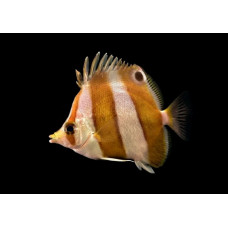Latin name
Roa modesta
Other name
Roa modesta
Identification
The body of these fishes is large, short, strongly compressed at the sides. The head is small, compressed at the sides. The tail is short. The mouth is small, pointed. Jaws with thin, long, flexible, bristle-like teeth. Premaxilla smooth. Gill openings narrow. The head is almost completely covered with scales. The body is covered with ctenoid scales. The lateral line is arched and runs parallel to the back.
Features of fish fins
Dorsal spines (total): 11; Dorsal soft rays (total): 20 - 23; Anal spines: 3; Anal soft rays: 16 - 19.
Dorsal fin solid, without notch. Caudal fin fan-shaped.
Fish colouring
Brown banded butterflyfish have a black spot on their dorsal fin. They also have a vertical dark band across the eye and two broad stripes on the sides of the body.
Distribution
Widespread in the western Pacific: subtropical waters off Japan, extending south to the China Sea, Taiwan and the Philippines.
Habitat
A marine, oceanodromous, tropical, reef associated species. Depth range 40-250 m. Can be found between thickets of seaweed.
Size
The maximum length of this species is 17 cm.
Behavior
Found in shallow muddy open areas with reef outcrops or rubble in subtropical waters, often in aggregations.
Food and feeding habits
In its natural environment, the brown-banded butterflyfish feeds on zooplankton.
Reproduction
Laying eggs, forming pairs during reproduction.Fishing
Amethyst anthias are of no commercial interest in fisheries.
Relationship with a person
Harmless.
| Classification | |
| Phylum | Chordata |
| Class | Actinopterygii |
| Squad | Acanthuriformes |
| Family | Chaetodontidae |
| Genus | Roa |
| Species | R. modesta |
| Features | |
| Conservation status | Least Concern |
| Habitat | Pelagic |
| Life span, years | No information |
| Maximum body weight, kg | No information |
| Maximum length, cm | 17 |
| Sailing speed, m/s | No information |
| Threat to people | Not edible |
| Way of eating | Planktonophage |



